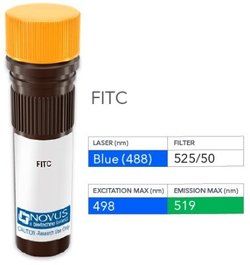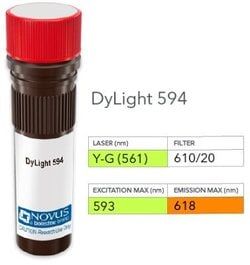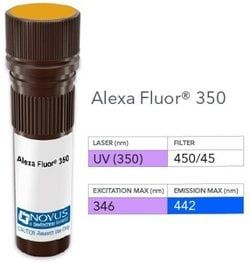CD35 Antibody (E11), FITC, Novus Biologicals™
Manufacturer: Novus Biologicals
Select a Size
| Pack Size | SKU | Availability | Price |
|---|---|---|---|
| Each of 1 | NB005614-Each-of-1 | In Stock | ₹ 57,716.50 |
NB005614 - Each of 1
In Stock
Quantity
1
Base Price: ₹ 57,716.50
GST (18%): ₹ 10,388.97
Total Price: ₹ 68,105.47
Antigen
CD35
Classification
Monoclonal
Conjugate
FITC
Formulation
PBS with 0.05% Sodium Azide
Gene Symbols
CR1
Immunogen
Intact human monocytes were used as immunogen to generate the CD35 antibody (Hogg et al, 1984).
Quantity
0.1 mL
Primary or Secondary
Primary
Target Species
Human, Monkey
Isotype
IgG1 κ
Applications
ELISA
Clone
E11
Dilution
ELISA
Gene Alias
complement component (3b/4b) receptor 1 (Knops blood group), KN
Host Species
Mouse
Purification Method
Protein A or G purified
Regulatory Status
RUO
Test Specificity
Recognizes a protein of 210-220kDa, which is identified as the complement receptor 1 (CR1)/CD35. This monoclonal antibody is specific for a site in CR1 that is distal from the C3b-binding site, so that it is unable to block CR1 activity. This monoclonal antibody is highly specific to CR1 and shows no cross-reaction with CR2. The primary function of CR1 is to serve as the cellular receptor for C3b and C4b, the most important components of the complement system leading to clearance of foreign macromolecules. The Knops blood group system is a system of antigens located on this protein. Follicular dendritic cells (FDC) are restricted to the B-cell regions of secondary lymphoid follicles. They are CD21+/CD35+/CD1a-. This monoclonal antibody labels follicular dendritic cells and follicular dendritic cell sarcoma.
Content And Storage
Store at 4°C in the dark.
Related Products
Description
- CD35 Monoclonal specifically detects CD35 in Human, Monkey, Baboon, Cynomolgus Monkey, Rhesus Macaque samples
- It is validated for Flow Cytometry, Immunohistochemistry, Immunocytochemistry/Immunofluorescence, Immunohistochemistry-Paraffin.



